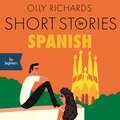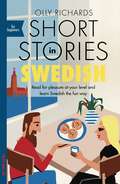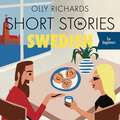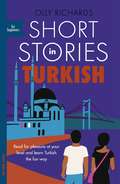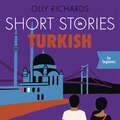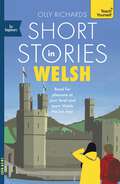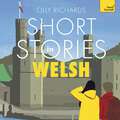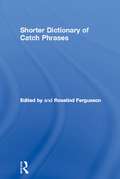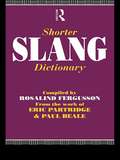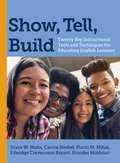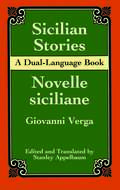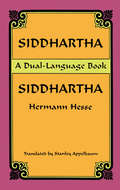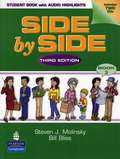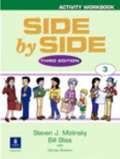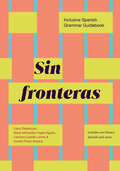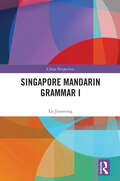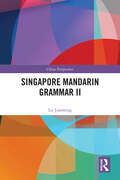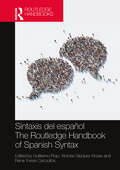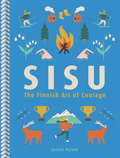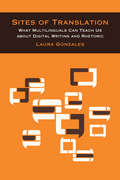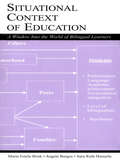- Table View
- List View
Short Stories in Spanish for Beginners: Read for pleasure at your level, expand your vocabulary and learn Spanish the fun way! (Foreign Language Graded Reader Series)
by Olly RichardsAn unmissable collection of eight unconventional and captivating short stories for young and adult learners."I love Olly's work - and you will too!" - Barbara Oakley, PhD, Author of New York Times bestseller A Mind for NumbersShort Stories in Spanish for Beginners has been written especially for students from beginner to intermediate level, designed to give a sense of achievement, and most importantly - enjoyment! Mapped to A2-B1 on the Common European Framework of Reference, these eight captivating stories will both entertain you, and give you a feeling of progress when listening.What does this book give you?· Eight stories in a variety of exciting genres, from science fiction and crime to history and thriller - making learning fun, while you gain a wide range of new vocabulary· Controlled language at your level, including the 1000 most frequent words, to help you progress confidently· Authentic spoken dialogues, to help you learn conversational expressions and improve your speaking ability· Pleasure! It's much easier to learn a new language when you're having fun, and research shows that if you're enjoying listening in a foreign language, you won't experience the usual feelings of frustration - 'It's too hard!' 'I don't understand!'· Accessible grammar so you learn new structures naturally, in a stress-free wayCarefully curated to make learning a new language easy, these stories will entertain you, while at the same time allowing you to benefit from an improved range of vocabulary and a better grasp of the language, without ever feeling overwhelmed or frustrated. From science fiction to fantasy, to crime and thrillers, Short Stories in Spanish for Beginners will make learning Spanish easy and enjoyable.
Short Stories in Swedish for Beginners: Read for pleasure at your level, expand your vocabulary and learn Swedish the fun way!
by Olly RichardsAn unmissable collection of eight unconventional and captivating short stories for young and adult learners of Swedish."Olly's top-notch language-learning insights are right in line with the best of what we know from neuroscience and cognitive psychology about how to learn effectively. I love his work - and you will too!" - Barbara Oakley, PhD, Author of New York Times bestseller A Mind for NumbersShort Stories in Swedish for Beginners has been written especially for students from high-beginner to low-intermediate level, designed to give a sense of achievement, a feeling of progress and most importantly - enjoyment! Mapped to A1-B1 on the Common European Framework of Reference (CEFR) for languages, these eight captivating stories are designed to give you a sense of achievement and a feeling of progress when reading.What does this book give you?- Eight stories in a variety of exciting genres, from science fiction and crime to history and thriller - making reading fun, while you learn a wide range of new vocabulary- Controlled language at your level to help you progress confidently- Realistic spoken dialogues to help you learn conversational expressions and improve your speaking ability- Accessible grammar so you learn new structures naturally, in a stress-free way- Pleasure! Research shows that if you're enjoying reading in a foreign language, you won't experience the usual feelings of frustration - 'It's too hard!' 'I don't understand!'Carefully curated to make learning a new language easy, these stories include key features that will support and consolidate your progress, including: - A glossary for bolded words in each chapter- Full plot summary- A bilingual word list- Comprehension questions after each chapter. As a result, you will be able to focus on enjoying reading, delighting in your improved range of vocabulary and grasp of the language, without ever feeling overwhelmed. From science fiction to fantasy, to crime and thrillers, Short Stories in Swedish for Beginners will make learning Swedish easy and enjoyable.
Short Stories in Swedish for Beginners: Read for pleasure at your level, expand your vocabulary and learn Swedish the fun way! (Foreign Language Graded Reader Series)
by Olly RichardsAn unmissable collection of eight unconventional and captivating short stories for young and adult learners of Swedish."Olly's top-notch language-learning insights are right in line with the best of what we know from neuroscience and cognitive psychology about how to learn effectively. I love his work - and you will too!" - Barbara Oakley, PhD, Author of New York Times bestseller A Mind for Numbers Short Stories in Swedish for Beginners has been written especially for students from high-beginner to low-intermediate level, designed to give a sense of achievement, a feeling of progress and most importantly - enjoyment! Mapped to A1-B1 on the Common European Framework of Reference (CEFR) for languages, these eight captivating stories are designed to give you a sense of achievement and a feeling of progress when reading.What does this book give you?- Eight stories in a variety of exciting genres, from science fiction and crime to history and thriller - making reading fun, while you learn a wide range of new vocabulary- Controlled language at your level to help you progress confidently- Realistic spoken dialogues to help you learn conversational expressions and improve your speaking ability- Accessible grammar so you learn new structures naturally, in a stress-free way- Pleasure! Research shows that if you're enjoying reading in a foreign language, you won't experience the usual feelings of frustration - 'It's too hard!' 'I don't understand!'Carefully curated to make learning a new language easy, these stories include key features that will support and consolidate your progress, including: - A glossary for bolded words in each chapter- Full plot summary- A bilingual word list- Comprehension questions after each chapter. As a result, you will be able to focus on enjoying reading, delighting in your improved range of vocabulary and grasp of the language, without ever feeling overwhelmed. From science fiction to fantasy, to crime and thrillers, Short Stories in Swedish for Beginners will make learning Swedish easy and enjoyable.
Short Stories in Swedish for Beginners: Read for pleasure at your level, expand your vocabulary and learn Swedish the fun way! (Readers)
by Olly RichardsAn unmissable collection of eight unconventional and captivating short stories for young and adult learners of Swedish."Olly's top-notch language-learning insights are right in line with the best of what we know from neuroscience and cognitive psychology about how to learn effectively. I love his work - and you will too!" - Barbara Oakley, PhD, Author of New York Times bestseller A Mind for Numbers Short Stories in Swedish for Beginners has been written especially for students from high-beginner to low-intermediate level, designed to give a sense of achievement, a feeling of progress and most importantly - enjoyment! Mapped to A2-B1 on the Common European Framework of Reference, these eight captivating stories are designed to give you a sense of achievement and a feeling of progress when reading.What does this book give you?- Eight stories in a variety of exciting genres, from science fiction and crime to history and thriller - making reading fun, while you learn a wide range of new vocabulary- Controlled language at your level, including the 1000 most frequent words, to help you progress confidently- Authentic spoken dialogues, to help you learn conversational expressions and improve your speaking ability- Accessible grammar so you learn new structures naturally, in a stress-free way- Pleasure! It's much easier to learn a new language when you're having fun, and research shows that if you're enjoying reading in a foreign language, you won't experience the usual feelings of frustration - 'It's too hard!' 'I don't understand!'Carefully curated to make learning a new language easy, these stories include key features that will support and consolidate your progress, including - A glossary for bolded words in each text - Full plot summary- A bilingual word list- Comprehension questions after each chapter. As a result, you will be able to focus on enjoying reading, delighting in your improved range of vocabulary and grasp of the language, without ever feeling overwhelmed or frustrated. From science fiction to fantasy, to crime and thrillers, Short Stories in Swedish for Beginners will make learning Swedish easy and enjoyable.(P) 2019 Hodder & Stoughton Ltd
Short Stories in Turkish for Beginners: Read for pleasure at your level, expand your vocabulary and learn Turkish the fun way!
by Olly RichardsAn unmissable collection of eight unconventional and captivating short stories for young and adult learners of Turkish."Olly's top-notch language-learning insights are right in line with the best of what we know from neuroscience and cognitive psychology about how to learn effectively. I love his work - and you will too!" - Barbara Oakley, PhD, Author of New York Times bestseller A Mind for NumbersShort Stories in Turkish for Beginners has been written especially for learners from high-beginner to low-intermediate level, designed to give a sense of achievement, and most importantly - enjoyment! Mapped to A2-B1 on the Common European Framework of Reference (CEFR) for languages, these eight captivating stories will both entertain you, and give you a feeling of progress when reading.What does this book give you?· Eight stories in a variety of exciting genres, from science fiction and crime to history and thriller - making reading fun, while you learn a wide range of new vocabulary· Controlled language at your level to help you progress confidently· Realistic spoken dialogues to help you learn conversational expressions and improve your speaking ability· Accessible grammar so you learn new structures naturally, in a stress-free way· Beautiful illustrations accompanying each story, to set the scene and support your understanding· Pleasure! Research shows that if you're enjoying reading in a foreign language, you won't experience the usual feelings of frustration - 'It's too hard!' 'I don't understand!'Carefully curated to make learning a new language easy, these stories include key features that will support and consolidate your progress, including:· A glossary for bolded words in each chapter· A bilingual word list· Full plot summary· Comprehension questions after each chapter. As a result, you will be able to focus on enjoying reading, delighting in your improved range of vocabulary and grasp of the language, without ever feeling overwhelmed. From science fiction to fantasy, to crime and thrillers, Short Stories in Turkish for Beginners will make learning Turkish easy and enjoyable.
Short Stories in Turkish for Beginners: Read for pleasure at your level, expand your vocabulary and learn Turkish the fun way! (Foreign Language Graded Reader Series)
by Olly RichardsAn unmissable collection of eight unconventional and captivating short stories for young and adult learners of Turkish."Olly's top-notch language-learning insights are right in line with the best of what we know from neuroscience and cognitive psychology about how to learn effectively. I love his work - and you will too!" - Barbara Oakley, PhD, Author of New York Times bestseller A Mind for NumbersShort Stories in Turkish for Beginners has been written especially for learners from high-beginner to low-intermediate level, designed to give a sense of achievement, and most importantly - enjoyment! Mapped to A2-B1 on the Common European Framework of Reference (CEFR) for languages, these eight captivating stories will both entertain you, and give you a feeling of progress when reading.What does this book give you?· Eight stories in a variety of exciting genres, from science fiction and crime to history and thriller - making reading fun, while you learn a wide range of new vocabulary· Controlled language at your level to help you progress confidently· Realistic spoken dialogues to help you learn conversational expressions and improve your speaking ability· Accessible grammar so you learn new structures naturally, in a stress-free way· Beautiful illustrations accompanying each story, to set the scene and support your understanding· Pleasure! Research shows that if you're enjoying reading in a foreign language, you won't experience the usual feelings of frustration - 'It's too hard!' 'I don't understand!'Carefully curated to make learning a new language easy, these stories include key features that will support and consolidate your progress, including:· A glossary for bolded words in each chapter· A bilingual word list· Full plot summary· Comprehension questions after each chapter. As a result, you will be able to focus on enjoying reading, delighting in your improved range of vocabulary and grasp of the language, without ever feeling overwhelmed. From science fiction to fantasy, to crime and thrillers, Short Stories in Turkish for Beginners will make learning Turkish easy and enjoyable.
Short Stories in Turkish for Beginners: Read for pleasure at your level, expand your vocabulary and learn Turkish the fun way! (Foreign Language Graded Reader Series)
by Olly RichardsAn unmissable collection of eight unconventional and captivating short stories for young and adult learners of Turkish."Olly's top-notch language-learning insights are right in line with the best of what we know from neuroscience and cognitive psychology about how to learn effectively. I love his work - and you will too!" - Barbara Oakley, PhD, Author of New York Times bestseller A Mind for NumbersShort Stories in Turkish for Beginners has been written especially for students from high-beginner to low-intermediate level, designed to give a sense of achievement, and most importantly - enjoyment! Mapped to A2-B1 on the Common European Framework of Reference (CEFR), these eight captivating stories will both entertain you, and give you a feeling of progress when reading.What does this book give you?· Eight stories in a variety of exciting genres, from science fiction and crime to history and thriller - making reading fun, while you learn a wide range of new vocabulary· Controlled language at your level, including the 1000 most frequent words, to help you progress confidently· Authentic spoken dialogues, to help you learn conversational expressions and improve your speaking ability· Pleasure! It's much easier to learn a new language when you're having fun, and research shows that if you're enjoying reading in a foreign language, you won't experience the usual feelings of frustration - 'It's too hard!' 'I don't understand!'· Accessible grammar so you learn new structures naturally, in a stress-free wayCarefully curated to make learning a new language easy, these stories include key features that will support and consolidate your progress, including· A glossary for bolded words in each text· A bilingual word list· Full plot summary· Comprehension questions after each chapter. As a result, you will be able to focus on enjoying reading, delighting in your improved range of vocabulary and grasp of the language, without ever feeling overwhelmed or frustrated. From science fiction to fantasy, to crime and thrillers, Short Stories in Turkish for Beginners will make learning Turkish easy and enjoyable.(P) 2020 Hodder & Stoughton Ltd
Short Stories in Welsh for Beginners: Read for pleasure at your level, expand your vocabulary and learn Welsh the fun way! (Readers)
by Olly RichardsAn unmissable collection of eight unconventional and captivating short stories for young and adult learners of Swedish."Olly's top-notch language-learning insights are right in line with the best of what we know from neuroscience and cognitive psychology about how to learn effectively. I love his work - and you will too!" - Barbara Oakley, PhD, Author of New York Times bestseller A Mind for Numbers Short Stories in Welsh for Beginners has been written especially for students from high-beginner to low-intermediate level, designed to give a sense of achievement, a feeling of progress and most importantly - enjoyment! Mapped to A1-B1 on the Common European Framework of Reference (CEFR) for languages, these eight captivating stories are designed to give you a sense of achievement and a feeling of progress when reading.What does this book give you?- Eight stories in a variety of exciting genres, from science fiction and crime to history and thriller - making reading fun, while you learn a wide range of new vocabulary- Controlled language at your level to help you progress confidently- Realistic spoken dialogues to help you learn conversational expressions and improve your speaking ability- Accessible grammar so you learn new structures naturally, in a stress-free way- Pleasure! Research shows that if you're enjoying reading in a foreign language, you won't experience the usual feelings of frustration - 'It's too hard!' 'I don't understand!'Carefully curated to make learning a new language easy, these stories include key features that will support and consolidate your progress, including: - A glossary for bolded words in each chapter- Full plot summary- A bilingual word list- Comprehension questions after each chapter. As a result, you will be able to focus on enjoying reading, delighting in your improved range of vocabulary and grasp of the language, without ever feeling overwhelmed. From science fiction to fantasy, to crime and thrillers, Short Stories in Welsh for Beginners will make learning Welsh easy and enjoyable.
Short Stories in Welsh for Beginners: Read for pleasure at your level, expand your vocabulary and learn Welsh the fun way! (Readers)
by Olly RichardsAn unmissable collection of eight unconventional and captivating short stories for young and adult learners of Swedish."Olly's top-notch language-learning insights are right in line with the best of what we know from neuroscience and cognitive psychology about how to learn effectively. I love his work - and you will too!" - Barbara Oakley, PhD, Author of New York Times bestseller A Mind for Numbers Short Stories in Welsh for Beginners has been written especially for students from high-beginner to low-intermediate level, designed to give a sense of achievement, a feeling of progress and most importantly - enjoyment! Mapped to A1-B1 on the Common European Framework of Reference (CEFR) for languages, these eight captivating stories are designed to give you a sense of achievement and a feeling of progress when reading.What does this book give you?- Eight stories in a variety of exciting genres, from science fiction and crime to history and thriller - making reading fun, while you learn a wide range of new vocabulary- Controlled language at your level to help you progress confidently- Realistic spoken dialogues to help you learn conversational expressions and improve your speaking ability- Accessible grammar so you learn new structures naturally, in a stress-free way- Pleasure! Research shows that if you're enjoying reading in a foreign language, you won't experience the usual feelings of frustration - 'It's too hard!' 'I don't understand!'Carefully curated to make learning a new language easy, these stories include key features that will support and consolidate your progress, including: - A glossary for bolded words in each chapter- Full plot summary- A bilingual word list- Comprehension questions after each chapter. As a result, you will be able to focus on enjoying reading, delighting in your improved range of vocabulary and grasp of the language, without ever feeling overwhelmed. From science fiction to fantasy, to crime and thrillers, Short Stories in Welsh for Beginners will make learning Welsh easy and enjoyable.
Short Stories in Welsh for Beginners: Read for pleasure at your level, expand your vocabulary and learn Welsh the fun way! (Readers)
by Olly RichardsAn unmissable collection of eight unconventional and captivating short stories for young and adult learners of Welsh."Olly's top-notch language-learning insights are right in line with the best of what we know from neuroscience and cognitive psychology about how to learn effectively. I love his work - and you will too!" - Barbara Oakley, PhD, Author of New York Times bestseller A Mind for Numbers Short Stories in Welsh for Beginners has been written especially for students from high-beginner to low-intermediate level, designed to give a sense of achievement, a feeling of progress and most importantly - enjoyment! Mapped to A2-B1 on the Common European Framework of Reference, these eight captivating stories are designed to give you a sense of achievement and a feeling of progress when reading.What does this book give you?- Eight stories in a variety of exciting genres, from science fiction and crime to history and thriller - making reading fun, while you learn a wide range of new vocabulary- Controlled language at your level, including the 1000 most frequent words, to help you progress confidently- Authentic spoken dialogues, to help you learn conversational expressions and improve your speaking ability- Accessible grammar so you learn new structures naturally, in a stress-free way- Pleasure! It's much easier to learn a new language when you're having fun, and research shows that if you're enjoying reading in a foreign language, you won't experience the usual feelings of frustration - 'It's too hard!' 'I don't understand!'Carefully curated to make learning a new language easy, these stories include key features that will support and consolidate your progress, including - A glossary for bolded words in each text - Full plot summary- A bilingual word list- Comprehension questions after each chapter. As a result, you will be able to focus on enjoying reading, delighting in your improved range of vocabulary and grasp of the language, without ever feeling overwhelmed or frustrated. From science fiction to fantasy, to crime and thrillers, Short Stories in Welsh for Beginners will make learning Welsh easy and enjoyable.
Shorter Dictionary of Catch Phrases: From The Work Of Eric Partridge And Paul Beale
by Rosalind FergussonThis collection will appeal to everyone who has ever wondered about the origin of phrases like "all part of life's rich pattern" and "long time no see". It covers a wide range of catch phrases in current use in all parts of the English-speaking world. Most entries are drawn from the second edition of Eric Partridge's Dictionary of Catch Phrases (second edition, edited by Paul Beale), but have been completely rewritten in the light of recent research, and there are many additions. Catch Phrases include: close your eyes and think of England! have I got news for you! ... refreshes the parts that other ... cannot reach some mothers do'ave'em! you are awful, but I like you.
Shorter Slang Dictionary
by Eric Partridge Paul BealeFrom abdabs to zit From pillock (14th century) to couch potato (20th century) From She'll be apples (Australia) to the pits (USA) This new collection brings together some 5,000 contemporary slang expressions originating in all parts of the English-speaking world. It gives clear and concise definitions of each word, supplemented by examples of their use and information about where and when they came into being. This entertaining reference work will be of use to students of English at all levels and a source of fascination to word-lovers throughout the world.
Show, Tell, Build: Twenty Key Instructional Tools and Techniques for Educating English Learners
by Joyce W. Nutta Kouider Mokhtari Carine Strebel Florin M. Mihai Edwidge Crevecoeur BryantBuilding upon the theoretical and practical foundation outlined in their previous book, Educating English Learners, the authors show classroom teachers how to develop a repertoire of instructional techniques that address K–12 English learners (ELs) at different English proficiency and grade levels, and across subject areas. Show, Tell, Build is organized around two decision maps for planning and implementing differentiated instruction for ELs: the Academic Subjects Protocol (for teachers of academic subjects) and the Language Arts Protocol (for teachers of language arts). The instructional tools and techniques described in each chapter help teachers provide communication support for ELs through showing and telling, and develop their language proficiency through building their skills. The book also discusses the demands that academic language poses for ELs and ways to assess students&’ proficiency in English. Show, Tell, Build provides classroom teachers, English language development specialists, literacy coaches, and school leaders with valuable knowledge and skills to support ELs&’ academic success.
Sicilian Stories: A Dual-Language Book
by Giovanni Verga Stanley AppelbaumThis outstanding selection of 12 short stories from the Italian verismo (realist) school features tales from the author's Vita dei campi (Rural Life) and Novelle rusticane (Rustic Stories). Selections include the celebrated "Cavalleria Rusticana" (Rustic Chivalry), "Nedda," "L'amante di Gramigna" (Gramigna's Mistress), "Reverie," "Jeli the Herdsman," "Nasty Redhead," and 6 others.
Siddhartha (Dover Dual Language German)
by Hermann HesseNobel prize-winning author Hermann Hesse imagined life in India during the lifetime of the Buddha to create this memorable tale about a restless seeker of enlightenment. First published in 1922, Siddhartha employs powerful symbolism to impart its timeless teachings.The story concerns a young Brahman who quits his comfortable home to join a roving group of holy men in striving to empty their hearts of passion and desire through self-denial and meditation. Discouraged by his failure to find Nirvana after three years of the strictest asceticism, the young seeker turns to the fleshly world, where he becomes a wealthy merchant and partakes of sensual pleasures with a sophisticated courtesan. Years of materialistic self-indulgence numb Siddhartha's soul, but at his moment of greatest despondency, he begins to experience his long-sought spiritual awakening. True enlightenment, he realizes, cannot be received from the lessons of others; it must be attained through individual struggle. This handy dual-language edition -- with its excellent line-for-line English translation on pages facing the original German text -- offers students an outstanding opportunity to hone their German-language skills while discovering a literary classic.
Side by Side #3 (3rd Edition)
by Steven J. Molinsky Bill BlissSide by Side has helped more than 25 millions students worldwide persist and succeed as language learners This course is a dynamic all skills programme that integrates conversation practice, reading, writing and listening - all in a light-hearted, fun and easy-to-use format. This edition promotes active communication between students. . . practising speaking together 'side by side',
Side by Side Activity Workbook, Book 3 (3rd Edition)
by Steven J. Molinsky Bill BlissThe Side by Side Activity Workbooks offer a variety of exercises for reinforcement, fully coordinated with the student texts. A special feature of the Activity Workbooks is the inclusion of GrammarRaps for practice with rhythm, stress, and intonation and GrammarSongs from the Side by Side TV videos. Periodic check-up tests are also included in the workbooks. Side by Side Plus is a standards-based and grammar-based English language program for adult and young-adult learners, The program builds students' general language proficiency and prepares them for their life-skill roles in the community, family, school, and at work.
Sin fronteras: Inclusive Spanish Grammar Guidebook
by Liana Stepanyan María Mercedes Fages Agudo Carolina Castillo Larrea Goretti Prieto BotanaSin fronteras: Inclusive Spanish Grammar Guidebook is the first ever Spanish language text to teach non-binary and gender-neutral language. It is an invaluable resource for intermediate and advanced learners that offers concise explanations and exercises for the major clausal structures, tenses, and moods. Along with including non-binary and gender-neutral language, the volume also incorporates the voseo, or the use of vos as a second-person singular pronoun that is common in many Latin American countries. This book expands the scope of traditional grammar instruction by including tasks such as reading, writing, discussions, and independent research in order to support the development of the competencies necessary to thrive in the increasingly interconnected and diverse world. Sin fronteras is suitable for independent study or for supplemental use in conversation classes, classes for heritage speakers, classes with focus on the professions (e.g., medical Spanish, Spanish for business), and literature classes.
Singapore Mandarin Grammar I (China Perspectives)
by Lu JianmingAs the first volume of a two-volume set that presents a comprehensive syntactical picture of Singapore Mandarin, this title discusses the distinguishing characteristics of the Chinese language and describes the grammar of Singapore Mandarin. The book first provides an overview of the grammar of Singapore Mandarin and compares it with Chinese Mandarin (Putonghua). As a variety of Mandarin Chinese, Singapore Mandarin is also characterised by syntactic rules taking precedence over morphological rules. Therefore, it is argued that word order and functional words are specifically important in the study of Singapore Mandarin. Then the author explicates the properties and functions of the following nine grammatical components: the five most basic phrase types, word classes, sentences, subjects and predicates, predicates and objects, predicates and complements, attributes and adverbials, complex predicate phrases, and prepositions and prepositional phrases. With rich and authentic language examples, the book will serve as a must-read for learners and teachers of Mandarin Chinese and linguistics scholars interested in global Chinese and especially Singapore Mandarin.
Singapore Mandarin Grammar II (China Perspectives)
by Lu JianmingAs the second volume of a two-volume set that presents a comprehensive syntactical picture of Singapore Mandarin, this title analyses various expressions relating to number, quantity, time and place, composite sentences and the characteristics and standardisation of Singapore Mandarin. The first two chapters discuss expressions of number, quantity, time and place in Singapore Mandarin and touch upon the differences in these expressions between Singapore and Chinese Mandarin (Putonghua). Composite sentences are then analysed, covering seven types of compound sentences and eight types of complex sentences, as well as connective words with a focus on conjunctions. The final part of the volume analyses the characteristics of Singapore Mandarin grammar compared with Chinese Mandarin, on the level of phrase, lexicon and sentence. From the perspectives of language contact, political and social contexts and bilingualism, it summarises the possible reasons for the differences between the two varieties of Chinese and points out primary challenges and major concerns of the standardisation of Singapore Mandarin. With rich and authentic language examples, the book will serve as a must read for learners and teachers of Mandarin Chinese and linguistics scholars interested in global Chinese and especially Singapore Mandarin.
Sintaxis del español / The Routledge Handbook of Spanish Syntax (Routledge Spanish Language Handbooks)
by Rena Torres Cacoullos Guillermo Rojo Victoria Vázquez RozasEl volumen Sintaxis del español/The Routledge Handbook of Spanish Syntax proporciona una visión general de los temas fundamentales de la sintaxis del español, basada en datos extraídos de corpus textuales, sensible a los fenómenos de variación y conectada con otros componentes de la lengua. La obra, escrita en español, reúne perspectivas teóricas diversas, elaboradas por un grupo internacional de lingüistas. Está dividida en seis partes y comprende 45 capítulos centrados en cuestiones teóricas, cláusulas, oraciones y estructuras supraoracionales, categorías verbales, frases y clases de palabras, variación y cambio sintácticos, así como acercamientos computacionales y sus diferentes aplicaciones. El volumen constituye una referencia fundamental para los investigadores al tiempo que proporciona una introducción accesible para estudiantes de la lengua y la lingüística españolas. Sintaxis del español / The Routledge Handbook of Spanish Syntax provides a comprehensive overview of topics in Spanish syntax, drawing on corpus-based data, incorporating variation, and connecting with other aspects of language. Written in Spanish, the volume brings together diverse theoretical perspectives from an international group of scholars. Divided into six parts, the book comprises 45 chapters on theoretical perspectives, clauses, sentences and (supra)sentential syntax, verb categories, phrases and word classes, syntactic variation and change, and computational approaches and their applications. This handbook is an essential reference for scholars and an accessible introduction for students of Spanish language and linguistics.
Sisu: The Finnish Art Of Courage
by Joanna NylundDiscover the Finnish quality of sisu and how cultivating it can help you lead a life of greater purpose and happiness.This ancient Finnish word describes an attitude of courage, resilience, grit, tenacity and perseverance. This key psychological competence enables extraordinary action in times of adversity. To have sisu confers a further dimension of doing so with honesty, integrity and humility.By cultivating sisu you can: Face life's challenges with courage and determination Enhance your wellbeing and find your focus Communicate confidently and resolve conflicts effectively Cultivate endurance and achieve your fitness goals Raise kind and resilient children Act with integrity and fight for what you believe inSisu is a universal trait. It may have been bottled and labelled by the Finns, but it is within reach of everyone. It lies within you, and you are very likely to have used it already.
Sisu: The Finnish Art of Courage
by Joanna NylundDiscover the Finnish quality of sisu and how cultivating it can help you lead a life of greater purpose and happiness.This ancient Finnish word describes an attitude of courage, resilience, grit, tenacity and perseverance. This key psychological competence enables extraordinary action in times of adversity. To have sisu confers a further dimension of doing so with honesty, integrity and humility.By cultivating sisu you can: Face life's challenges with courage and determination Enhance your wellbeing and find your focus Communicate confidently and resolve conflicts effectively Cultivate endurance and achieve your fitness goals Raise kind and resilient children Act with integrity and fight for what you believe inSisu is a universal trait. It may have been bottled and labelled by the Finns, but it is within reach of everyone. It lies within you, and you are very likely to have used it already.
Sites of Translation: What Multilinguals Can Teach Us about Digital Writing and Rhetoric (Sweetland Digital Rhetoric Collaborative)
by Laura GonzalesWinner of the 2016 Sweetland Digital Rhetoric Collaborative Book Prize Sites of Translation illustrates the intricate rhetorical work that multilingual communicators engage in as they translate information for their communities. Blending ethnographic and empirical methods from multiple disciplines, Laura Gonzales provides methodological examples of how linguistic diversity can be studied in practice, both in and outside the classroom, and provides insights into the rhetorical labor that is often unacknowledged and made invisible in multilingual communication. Sites of Translation is relevant to researchers and teachers of writing as well as technology designers interested in creating systems, pedagogies, and platforms that will be more accessible and useful to multilingual audiences. Gonzales presents multilingual communication as intellectual labor that should be further valued in both academic and professional spaces, and supported by multilingual technologies and pedagogies that center the expertise of linguistically diverse communicators.
Situational Context of Education: A Window Into the World of Bilingual Learners
by Mar¡a Estela Brisk Angela Burgos Sara Ruth HamerlaThis book gives educators important answers to the urgent question of how teachers and schools can facilitate language minority and immigrant students' progress in school. It offers an innovative and powerful method teachers and students can use to study the situational context of education, providing both the theoretical background and the practical tools to implement this approach. The situational context of education includes linguistic, economic, social, cultural, and political factors, as well as conditions, such as students' personal characteristics, family support, and quality of instruction. All of these factors influence the lives of students and their academic performance and contribute in many ways, some subtle and indirect, to making the educational experience more or less difficult for different students. The premise of the book is that objective study of the situational context of education by both students and teachers is beneficial because it leads to a more realistic view of how to facilitate students' progress in school. Designed as a text for graduate courses for preservice and in-service teachers working with students in bilingual, ESL, mainstream, and special education classrooms, the goal is to engage readers in learning not only from the literature but also from studying the situational contexts of their own students. The focus here is on the factors that affect language minority and immigrant students in the United States, but the framework is equally powerful for work with student populations in other social contexts. *The Introduction includes an overview of the theory behind the study of the situational context of education and the implementation of this approach; describes the context of the pilot lessons included in the book; and explains how to use the lessons detailed in later chapters. *Chapters 2-6 focus on different factors in the situational context of education: linguistic, economic, social, cultural, and political. A three-part structure is used: "Classroom Implementation" (a rich description of one lesson in a real classroom); "Context Variables" (a theoretical explanation of the specific factor the chapter addresses, providing the research basis for the sample lesson objectives ); "Doing Analysis of the Context" (several sample lessons for implementation). The lessons are addressed to the teacher, with detailed ideas on how to carry out the lesson and evaluate the students' understanding of the situational context. *Five Appendices provide helpful resources for the implementation of the lessons: an Annotated bibliography of relevant K-12 children's literature; Instructional Approaches; Scoring Rubrics for Content Objectives; Guidelines for a Contrastive Study of Situational Context; and Lesson Template. The lessons have been thoroughly field-tested with students and teachers. Because these lessons work on multiple levels, Situational Context of Education: A Window Into the World of Bilingual Learners benefits students from first grade through preservice and in-service teachers in university courses. Teachers get to know their students and their predicaments within the social context of the United States, and at the same time, the lesson activities have a great impact on the students in their classes. All are helped to achieve academically while gaining awareness of situational factors affecting their lives.
